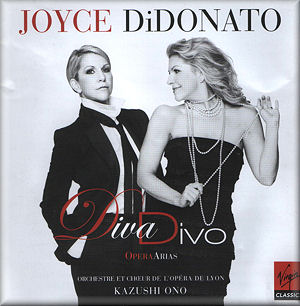 |
 |
|


alternatively
CD: MDT
AmazonUK
AmazonUS |
Diva, Divo
Jules MASSENET (1842-1912)
Je suis gris! - Chérubin (1905) [1:39]
Wolfgang Amadeus MOZART (1756-1791)
Giunse alfin il momento…Deh, vieni, non tardar - Le Nozze
di Figaro (1786) [4:36]
Christoph Willibald GLUCK (18714-1787)
Se mai senti spirarti sul volto - La Clemenza di Tito
(1752) [9:19]
Wolfgang Amadeus MOZART
Ecco il punto, o Vitellia …Non più di fiori - La
Clemenza di Tito (1791) [8:47]
Voi che sapete - Le Nozze di Figaro [2:52]
Gioachino ROSSINI (17982-1868)
Contro un cor - Il Barbiere di Siviglia (1816) [7:32]
Charles GOUNOD (1818-1893)
Faites-lui mes aveux - Faust (1859) [2:58]
Hector BERLIOZ (1803-1869)
D’amour l’ardente flamme - La Damnation de Faust
(1846) [8:08]
Premiers transports que nul n’oublie - Roméo et
Juliette (1839) [6:32]
Vincenzo BELLINI (1801-1835)
Ascolta! Se Romeo t’uccise un figlio…La tremendae ultrice
spada - I Capuleti e I Montecchi (1830) [7:11]
Jules MASSENET
Allez, laissez-moi seul…Cœur sans amour, Printemps sans
roses - Cendrillon (1899) [4:04]
Gioachino ROSSINI
Nacqui all’affanno - La Cenerentola (1817) [7:47]
Jules MASSENET
Ô frêle corps…Chère Cypris - Ariane
(1906) [5:56]
Richard STRAUSS (1864-1949)
Seien wir wieder gut! - Ariadne auf Naxos (1916) [3:18]
 Joyce DiDonato (mezzo); Edgaras Montvidas (tenor); Nabil Suliman
(baritone); Elena Semenova (soprano); Pascale Obrecht (mezzo); Paolo
Stupenengo (bass)
Joyce DiDonato (mezzo); Edgaras Montvidas (tenor); Nabil Suliman
(baritone); Elena Semenova (soprano); Pascale Obrecht (mezzo); Paolo
Stupenengo (bass)
Orchestre et Chœur de l’Opéra National de Lyon/Kazushi
Ono
rec. 18-28 September, 2010, Auditorium de l’Orchestre National
de Lyon
Original texts and English, French, German translations included
 VIRGIN CLASSICS 6419860 [80:41]
VIRGIN CLASSICS 6419860 [80:41] 
|
|
|
This is simply sensational! The music is excellent and
makes a satisfying programme; the singing and playing is top
class; and the idea behind the programme is very original. As
you can see from the track-listing, Joyce DiDonato has seized
on the ability down the years of mezzo-sopranos to “bend
the genders”, as she puts it, and to “convince equally
in both pants and skirts”. But in selecting the roles
for this programme she goes a step further and, in several instances,
shows us how one composer has reacted to one character in a
story and then gives us a taste of another composer’s
take on the complementary character from the same plot. So we
encounter, among others, Cinderella and Prince Charming; Sesto
and Vitellia; Cherubino and both Susanna and Rosina.
I’m not going to go through each character assumption,
save to say that I find Miss DiDonato convincing and plausible
in all the roles she essays. Her singing is never less than
wonderful, whether she’s called upon to execute the most
athletic and elaborate passagework (by Rossini) or to spin the
most seductive, sensuous line - by Massenet, for one.
But let me comment on a few highlights. Sesto’s aria,
his farewell to Vitellia, offers some of the most touching singing
on the disc. Joyce DiDonato’s singing here is just fabulous.
She displays intense yet dignified emotion and her lovely tone
and seamless line afford great pleasure. I was particularly
taken with - and moved by - her exquisitely placed soft high
notes. And all this takes place against the background of Gluck’s
refined, subdued accompaniment.
The performance of ‘D’amour l’ardente flamme’
is on a similarly exalted level of accomplishment. The plangent,
poignant cor anglais melody makes its mark every time it appears.
Miss DiDonato’s assumption of the character of Marguerite
is by turns touching and passionate. She’s equally successful
in the second Berlioz item, where she brings out what annotator
Roger Pines rightly calls the “mesmerizing serenity”
of Berlioz’s music. On the evidence of these two items,
how I would love to hear her in Les Nuits d’Été:
her voice would be ideally suited to most if not all of those
songs.
Her Rossini is simply adorable. I thought she was hugely impressive
in Pappano’s recent, excellent recording of the Stabat
Mater (review).
On this present disc the nature of the music is very different
but no less demanding. She clearly relishes the varied challenges
of Rosina’s aria, while the aria from La Cenerentola
is dazzling. In both these pieces one can only admire her vocal
agility, her range and her complete command of the music. The
technique is formidable.
Massenet is a gift to her voice, with its opportunities for
“sensuously beautiful legato” in Roger Pines’
words. And the recital opens and ends brilliantly with the giddy,
intoxicated Chérubin at the start and Strauss’s
impetuous, ardent Composer at the end.
Look at the cover of this disc and you may get an idea of what’s
in store, especially from the photo of Miss DiDonato in feminine
costume. She looks full of fun - dare one say, ready to party.
That impression is maintained in her infectious introductory
note in the booklet and then it’s reinforced in spades
on every track on this disc. Here is a diva letting her hair
down, having a ball and inviting us to join her. It’s
an irresistible invitation.
All that remains to say is that the orchestral support from
the orchestra of l’Opéra National de Lyon and Kazushi
Ono is fully worthy of their illustrious soloist. I hope I’ve
whetted your appetite for a fantastic disc. Enjoy!
John Quinn
|
|















